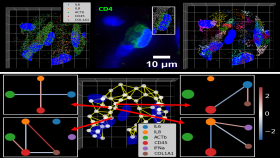Stanislav Emelianov, a jointly appointed professor in the Wallace H. Coulter Department of Biomedical Engineering at Georgia Tech and Emory University, and professor in the School of Electrical & Computer Engineering at Georgia Tech, was named an IEEE Fellow effective January 1, 2020. Emelianov was recognized by IEEE “for contributions to ultrasound elasticity and photoacoustic imaging.”
The IEEE Grade of Fellow is conferred by the IEEE board of directors upon a person with an outstanding record of accomplishments in any of the IEEE fields of interest. IEEE Fellow is the highest grade of membership and is recognized by the technical community as a prestigious honor and an important career achievement.
Emelianov is also a Joseph M. Pettit Endowed Chair, Georgia Research Alliance Eminent Scholar, a member of the Petit Institute for Bioengineering and Bioscience, and is affiliated with the Winship Cancer Institute at Emory University, Department of Radiology, and other clinical units.
With 25 years of work in the field of advanced imaging, Emelianov is a renowned innovator in advanced imaging methods to diagnose, monitor, and treat disease. His most recent development is a form of multi-purpose imaging that inspects both anatomical and biochemical properties of human tissue, revealing an unprecedented level of clarity and detail at the molecular level. This added power speeds the diagnosis of conditions like heart disease and cancer, opening the door to more highly targeted treatments.
The molecular precision of Emelianov's imaging tool makes it especially relevant in the field of cancer treatment. Cancer typically begins with a disruption to the healthy functioning of molecular machinery. When cancer manifests as a tumor, it can be more easily diagnosed. But metastatic cancers, where the cancerous cells first begin to invade the lymph nodes, are the most deadly of all, causing the vast majority of deaths. Emlianov’s imaging tool is potent enough to reveal even tiny numbers of these cancerous cells.
Emelianov’s additional imaging tools and technologies will also help deliver more personalized, targeted therapeutics to an individual patient. Throughout his career, Emelianov has been devoted to the development of advanced imaging methods capable of detecting and diagnosing cancer and other pathologies, assisting treatment planning, enhancing image-guided therapy, and monitoring of treatment outcomes.
The IEEE is the world’s leading professional association for advancing technology for humanity. Through its 400,000-plus members in 160 countries, the association is a leading authority on a wide variety of areas ranging from aerospace systems, computers and telecommunications to biomedical engineering, electric power, and consumer electronics.
Dedicated to the advancement of technology, the IEEE publishes 30 percent of the world’s literature in the electrical and electronics engineering and computer science fields, and has developed more than 1,300 active industry standards. The association also sponsors or co-sponsors nearly 1,700 international technical conferences each year. To learn more about IEEE or the IEEE Fellow Program, visit www.ieee.org.
Media Contact
Walter Rich
Keywords
Latest BME News
Commercialization program in Coulter BME announces project teams who will receive support to get their research to market.
Courses in the Wallace H. Coulter Department of Biomedical Engineering are being reformatted to incorporate AI and machine learning so students are prepared for a data-driven biotech sector.
Influenced by her mother's journey in engineering, Sriya Surapaneni hopes to inspire other young women in the field.
Coulter BME Professor Earns Tenure, Eyes Future of Innovation in Health and Medicine
The grant will fund the development of cutting-edge technology that could detect colorectal cancer through a simple breath test
The surgical support device landed Coulter BME its 4th consecutive win for the College of Engineering competition.
New research from Georgia Tech helps doctors predict how therapies will interact with a child's immune system, potentially improving outcomes and reducing risks.








